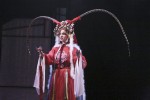An American man stands on stage, his body cloaked in a traditional red and gold Chinese robe, his head adorned with an extravagant headdress.
The stark contrast between the actor’s origins and his role as a Chinese Peking opera performer highlights the two main messages Zhou Xiao Wei, a student of theater directing who goes by “Smile” said she wishes to convey in her play “Begonia” – the importance of sharing traditions and the combination of cultures.
Wei’s play is an adaptation of the novel “Begonia” by Qin Shou’ou, published in 1942, and its sequel “Mabel.” The play, performed by undergraduate theater students, will run through Saturday at the Little Theater in Macgowan Hall.
Set from 1919 to 1937 during the Chinese cultural revolution, the story follows the life of a man named Begonia, who is a female impersonator for the Peking opera. Begonia impregnates a warlord’s wife, and when the warlord finds out about the affair, Begonia is forced to raise his daughter alone in poverty. Ashamed of his past as a female impersonator, he never tells his daughter; however, she eventually discovers his secret and questions her father about why he refuses to share his story with her.
Wei said she chose to do a Chinese play as her final thesis project because she saw it as an opportunity to tell an authentic story from her own language.
“I wanted to do a Chinese play because it is deep in my bones and my blood,” Wei said. “It’s about the beauty of the things that I grew up with.”
In order to write her script, Wei undertook the task of translating the novels “Begonia” and “Mabel” – both never printed in English. Although she has written plays in Chinese before, this was her first time writing one in English. Wei said the translation process was especially challenging because the novels use an older style of Chinese language than what is spoken today.
Wei said being both the writer and director posed some challenges. Since she wrote the script, Wei said she felt as though she could not alter it even if it was causing difficulty from the director standpoint. This issue caused the process to become messy at times, and Wei said she had to learn to balance the two differing mindsets.
First-year theater student Brandon Root, who plays Begonia’s brother, said Wei took an ensemble approach with her directing, allowing the cast to give input to the directing process.
“We did a lot of creative exercises in creating mood and environment with our physical bodies. The way she uses the body is unlike anything I’ve seen before on the stage,” Root said.
Wei said she took her own twist on the story by concentrating on the relationship between Begonia and his daughter more than the romance between him and the warlord’s wife.
“It’s about the inheritance of tradition,” Wei said. “The younger generation gets to know the older generation’s history and learns to appreciate it.”
Unlike Begonia who hides his past in the Peking opera, Wei said it is important for the younger generation to be aware of older traditions. These traditions are part of their Chinese identity and should be appreciated.
Incorporating this belief into her production, Wei includes Peking opera techniques throughout the play. A Peking opera teacher from San Francisco was hired to train the actors in the intricate dancing and singing style.
First-year theater student Davis Anderson, who plays Begonia, said that each step’s distance and each hand gesture means something specific, which causes the actors to be more aware of their bodies.
“In American society, we are used to doing things in the most efficient way possible. This was all about slowing down and thinking about what every movement means while you are saying the words and making it beautiful,” Anderson said.
Wei said teachers and students voiced concerns about being able to present a credible Chinese story while using non-Chinese actors. With only one Chinese actor in the play, the majority of the cast is American.
Despite these initial reservations, Wei said that she believes the lack of a Chinese cast does not jeopardize the authenticity of the play. Because the play is presented with the correct Chinese mannerisms, Wei said the race of the actors is irrelevant. Wei said that the contradiction also embodies the message of sharing traditions that “Begonia” emphasizes.
By participating in the process of Peking opera, Wei said the actors and those who come to support the show will be participators in the culture instead of just spectators.
“I want the people to say that these are American actors telling a Chinese story,” Wei said. “It’s the communication of culture.”
